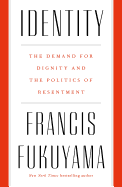
After the collapse of the Soviet Union in 1991, geopolitical expert Francis Fukuyama famously argued the triumph of liberal democracy signaled "the end of history." In Identity: The Demand for Dignity and the Politics of Resentment, Fukuyama revisits his old thesis and argues that in the 21st century, liberal democracy is under threat from myopic identity politics on both the political right and left.
Fukuyama's thesis is compelling. He traces the evolution of democracy, from Ancient Greece to modern times, and delineates the philosophic developments underlying contemporary political rights and concepts of equality. Marxist economic views of development have failed, he insists, because they've overlooked the importance of what he calls "thymos," the "part of the soul that craves recognition of dignity." This desire can sustain democratic institutions and equality if citizens share common civic ideals and believe they're part of something greater than themselves. Fukuyama points to Brexit as an example of the opposite: a narrow identity-based interest group superseding a common identity, in this case the European Union.
Much of Identity focuses on the darker side of identity politics. Thymos can easily morph into what the author labels "megalothymia," the "desire to be recognized as superior." This desire has fueled a new wave of nationalism and the rise of authoritarian leaders in China, Russia and elsewhere. Fukuyama sounds the alarm bells about the nationalistic tendencies of Donald Trump and argues that liberal democratic systems must resist sectarian identity politics. He also offers some practical advice on how better to assimilate immigrants and minorities into democracies.
Identity provides a long-term view of political history while remaining relevant to the present day. --Scott Neuffer, writer, poet, editor of trampset

